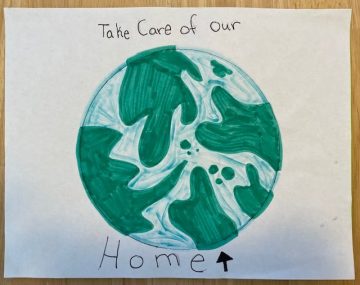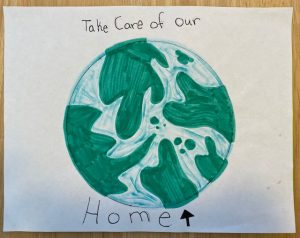By Amber
There is another forgotten Mother. The one who shelters our collective body outside the womb. A mother of multitudes and generations. The mother of lupine and sandstone and wilderness and wildebeest. A mother named Earth.
Moses wrote that God (the Father and Mother) “created all things . . . spiritually, before they were naturally upon the earth” (Moses 3:4-5). Their young came down to receive bodies—every herb and the tree yielding fruit. Great whales, winged fowl, cattle, and creeping things.
But in our lust for comfort and convenience, we’ve lost this animism. With every cheeseburger and plastic water bottle, we take this Mother for granted. Yet the doctrine of terrestrial stewardship echoes through the chambers of scripture:
And it pleaseth God that he hath given all these things unto man; for unto this end were they made to be used, with judgment, not to excess, neither by extortion. (D&C 59:20)
For it is expedient that I, the Lord, should make every man accountable, as a steward over earthly blessings, which I have made and prepared for my creatures. (D&C 104:13)
Thou shalt be diligent in preserving what thou hast, that thou mayest be a wise steward. (D&C 136:27)
A privileged minority consume the Mother’s reserves with audacity and abandon. We call it prosperity. If there is any regard for these verses in our daily motions, it’s buried beneath the rubble of cardboard Amazon boxes. Perhaps it’s because these words are so rarely referenced at the pulpit. We hear talks about how to define a neighbor, lessons on self-reliance, discourses on traditional marriage. And deafening silence on the devastation of our planet.
The closest we’ve come was a recent Ensign infographic that compared the life cycle of the Earth to that of a human, indicating that the planet will eventually die and be resurrected. As climate activists protested around the world, the implication of this message seemed to be that any attempt to “save” the Earth would be futile. This faulty logic is persistent. I first heard it as a teenager and, in the two decades since, things have only worsened. A renewal has yet to arrive. And now I have children whose future depends on a forsaken planet. And I ache for them. For the heat and the hunger and the misery they will face because of my laziness and ignorance. I ache for the children who’ve already been forced to abandon their dolls and toy trucks and classrooms as they flee climate-ravaged homes.
Still, an edict to multiply and replenish the Earth marches on without much regard for the parallel necessity to preserve a place for these offspring to thrive. In a rare address from a church leader on the subject, Elder Marcus B. Nash stated, “it cannot be reasonably disputed that we depend upon this earth to sustain life, and that the quality of the earth and its environment will directly affect the quality of our life—and that of future generations.”
But the notion of saving a whole planet is staggering, an oppressive weight bearing down on solitary shoulders. There are forces and institutions that tower like fortresses guarding the unsustainable status quo. In addition to legislation, the magnitude of change required demands collective action. And we are a people of action. A collective that professes the faith to move mountains. But we haven’t heard the call to arms. It’s barely a whisper.
These words are my disembodied voice, shouting from beneath the covers, desperate to amplify that whisper. To turn the hearts of the children to their Mother. To remember Her sacrifice for us. A plea for us to reciprocate and to reconcile. A call to place our excesses on the altar. For us to make some small sacrifice in turn.
It’s been suggested that reducing our meat and dairy intake is the change that will make the most immediate individual impact. As a major source of greenhouse gases and cause of deforestation, those cattle and creeping things have a greater purpose than to crowd our plates at breakfast, lunch, and dinner. Modern scripture is clearly supportive of this idea:
Yea, flesh also of beasts and of the fowls of the air, I, the Lord, have ordained for the use of man with thanksgiving; nevertheless they are to be used sparingly. And it is pleasing unto me that they should not be used, only in times of winter, or of cold, or famine. (D&C 89:12-13)
The revelation we refer to as a law of health also goes a long way as a loose blueprint for living in harmony with the Earth. Because of it, we’re fastidious in our avoidance of coffee. We shun drugs and alcohol. But we essentially ignore the rest. The part about eating seasonally, having temperance in our consumption of meat, and espousing a prevailing bias towards prudence.
A disposition towards minimizing our impact on the Earth and all its life forms also means more biking and walking, less driving and flying; more cloth, less plastic; more wind and solar, less fossil fuels; more compost, less garbage. All of which will ultimately connect us more deeply to the Mother we call Earth. Until the day when we rejoice with the fir trees and the cedars of Lebanon, with our Mother and our children, that no feller is come up against them, that She can finally be at rest (Isaiah 14:7-8).
Amber is an avid slow-jogger and true crime junkie living in Northern California with her husband and two daughters. You can find more practical ideas on reducing your carbon footprint here.





4 Responses
Thank you. Yes to all of this. One of the best things I have done for the size of my heart – it has grown so much! – is to stop eating animal-based products regularly. It gives me a sisterhood with the Earth and all its creeping things, and more respect for myself and my body, too. I can’t recommend it enough. I love this post.
Exactly! Thank YOU for sharing your resonant experience. I think many of us feel this way and we need to keep the conversation going!
Thank you! I agree whole-heartedly and find it disheartening how much we generally ignore our responsibility to take care of this beautiful earth and the amazing life forms that inhabit it. And it makes me sad that the church can own and sponsor hunting reserves….
Agreed! It seems so basic and yet we rarely hear about it in a doctrinal context. I know the church is aware of sustainability issues, but there’s clearly more to be done.